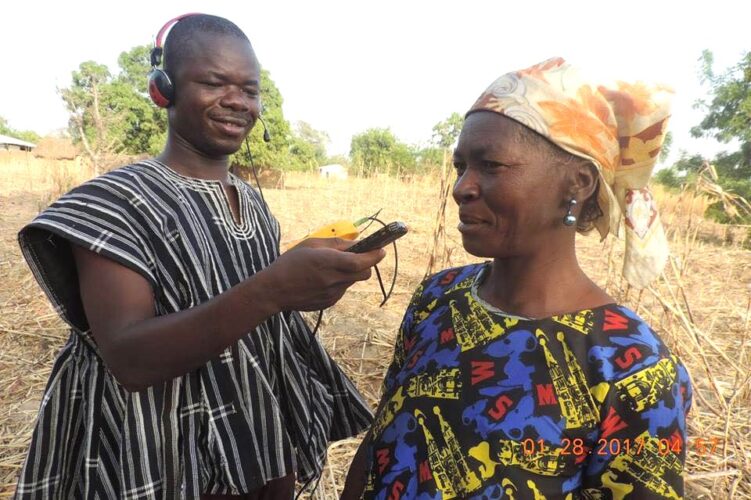Drama is an excellent tool to engage listeners. This is why Fidelis Dauri, an experienced social and behaviour change programming specialist at Jirapa FM, chose to integrate the mini-drama format into episodes about unpaid care work. He says, “I chose drama because radio dramas are captivating and can hold the audience’s attention.”
Jirapa FM is a radio station based in Ghana’s Jirapa municipality. The commercial radio station broadcasts 75% in local languages and 25% in English, striving to entertain, inform, and educate its listeners. He has been an active member of Farm Radio’s network for years.
The drama was featured on their weekday “Community Affair ” program, with one episode rebroadcast based on demand. The 45-minute program included the drama, an expert discussion, and a phone-in segment. The drama, “Her Unseen Contribution,” depicted the daily challenges faced by women like Madam Asana and Madam Bagberi of the Boyele community, where unpaid care work disproportionately falls on women due to cultural norms. Madam Asana, the wife of Mr. Bayuo, highlighted the mental and physical toll of managing household chores and childcare alone, exacerbated by societal expectations and a lack of support from her husband. In contrast, Madam Bagberi, supported by her husband Mr. Dery, demonstrated a harmonious partnership where domestic responsibilities were shared equitably, leading to a healthier and more supportive family environment.
By showcasing positive examples of men actively involved in caregiving, such as Mr. Dery, the program challenged traditional gender roles and advocated for positive social change within the community.
Creating the mini-drama involved several steps. It began with thorough research, including discussions with women’s groups and community leaders to gather real-life stories. The script was carefully crafted to accurately reflect the community context and experiences. Local actors were then selected to bring authenticity to the characters, followed by rehearsals to ensure natural and convincing performances. The final recording took place in a studio to ensure high-quality audio, with post-production editing adding the finishing touches.
Mr. Dauri noted, “The community response during the phone-in segment was overwhelmingly positive.” Following the drama segment, women called in to share personal experiences, expressing relief that their struggles were acknowledged on air. The program also featured expert contributions: a gender expert highlighted the economic value of unpaid care work and advocated for shared household responsibilities, while a mental health expert addressed the mental health impacts and offered practical coping strategies to listeners.
Mr. Dauri offers advice for other radio stations aspiring to produce dramas, emphasizing thorough research, efforts to ensure that the characters and plot are relatable, and the importance of rehearsals. He says, “With support from organizations like Farm Radio International, which provided resources and expertise, even those with limited experience can create impactful and engaging radio dramas.”
Jirapa FM produced this mini-drama as part of the network-based campaign to address unpaid care work, promoted by Farm Radio International. More than 200 episodes on this topic were aired by our radio partners in March and April 2024, and many continue to address this issue on air.

